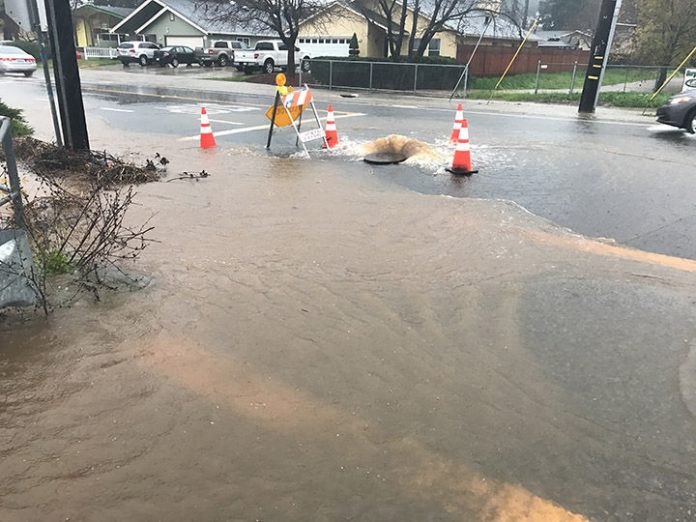
<
A massive discharge of raw sewage into Llagas Creek in San Martin earlier this month is under state investigation and could mean hefty fines levied against the City of Morgan Hill, according to the state agency that oversees water quality.
<
The discharge happened during heavy rains and runoff that overwhelmed the pipeline that carries sewage from Morgan Hill south through San Martin to the treatment plant in Gilroy, which is operated by the South County Regional Wastewater Authority.
<
An estimated 204,000 gallons of raw sewage from Morgan Hill was discharged into the creek during the Jan. 8 and 9 event, according to Environmental Scientist Jill North of the California Regional Water Quality Control Board in San Luis Obispo.
<
The spill is so recent it is still awaiting an initial investigation. It does not involve the wastewater authority because it occurred in Morgan Hill’s sewage collection system.
<
It is the second such spill from Morgan Hill’s system into Llagas Creek in San Martin in just over a year.
<
The other was on Dec. 15, 2015 at 14240 Monterey Highway when 12,000 gallons were discharged into the Llagas over a period of about two hours after an earlier attempt to repair an unrelated problem in the system suddenly failed.
<
That happened where both the trunk line and creek go under Monterey Highway, just north of San Martin Avenue from the east side of the highway, according to City of Morgan Hill staff.
<
That spill was limited in volume, apparently only because it was observed and reported by an alert California Highway Patrol officer, officials said.
<
The much larger and potentially more environmentally damaging Jan. 8 spill apparently went on for a lot longer before it was discovered. Most of the raw sewage from that breach ended up in the creek, officials said.
<
It occurred at 12690 Harding Ave., between Monterey Highway to the east and Santa Teresa Boulevard to the west, and Cox Avenue to the north and Highland Avenue to the south.
Fines could be hefty
<
Karl Bjarke, Morgan Hill’s Director of Engineering and Utilities, said it was caused by runoff from heavy rains. It was reported to state officials but he said he has not heard back from them yet and was unaware of the water board’s estimate of its size.
<
“Sewage systems are not necessarily water tight,” he said. “When you have (rain) water in the streets that pours into manhole lids, that is when you get…the sewage system getting overwhelmed,” he said.
<
It’s called “I and I,” which stands for infiltration and inflow, according to Bjarke. He said most cities experience the problem during heavy storm events and in some cases nothing can be done about it.
<
Morgan Hill notified the state water board immediately about the spill, according to Bjarke, but the damage to Llagas Creek had been done.
<
“We always try to clean it up and try to contain (the discharge) with sandbags and pump it into trucks and dispose of it properly, but in the middle of a storm like this it’s very difficult, he said, adding, “We did make an attempt to contain it but certainly a lot of it we obviously did not get.”
<
Coincidentally, Morgan Hill is in the process of installing a second trunk line to increase the city’s capacity to move raw sewage a dozen or so miles for treatment in southeast Gilroy.
<
Given the capacity of the current collection system and trunk line, and the amount of rain involved, spills are “unavoidable,” according to Bjarke.
<
North said the recent spill will be subject to an initial investigation that is about to begin.
<
As illegal raw sewage spills go, she characterized it as “big,” adding that infiltration of stormwater into a sanitary sewer system is not uncommon during “significant rain events.”
<
When that happens, state and federal laws come into play and fines can be significant, too.
<
The law provides for civil penalties by the water board of up to $10,000 for each day the violation occurs and up to $10 per gallon for each gallon in excess of 1,000 gallons that is discharged but not cleaned up.
<
Courts may impose fines of up to $25,000 per day and up to $25 per gallon not cleaned up over 1,000 gallons, according to the water board.
<
Morgan Hill remains in trouble with the board because of a failure to file timely follow-up reports about the 2015 discharge. That matter went to the full board at its two-day meeting Jan. 26 and 27.
<
Bjarke said the initial report was filed on time but not a subsequent report. It has since been filed, he said, taking full responsibility.
<
“A notice came to me when I was out of country. We have since given them all the information they need,” he said.
<
“We take these spills really seriously, but that (was) the city’s problem,” he acknowledged.
<
Morgan Hill had one other illegal discharge, of 250 gallons, between Jan. 1, 2014 and Sept. 30, 2015.
<
During the same period, Gilroy’s collection system had one of 1,000 gallons and one of 87 gallons, according to the water board.
<
Those cases, like the more recent in Morgan Hill, the violations “remain open to further investigation and therefore potential penalties,” according to North.







